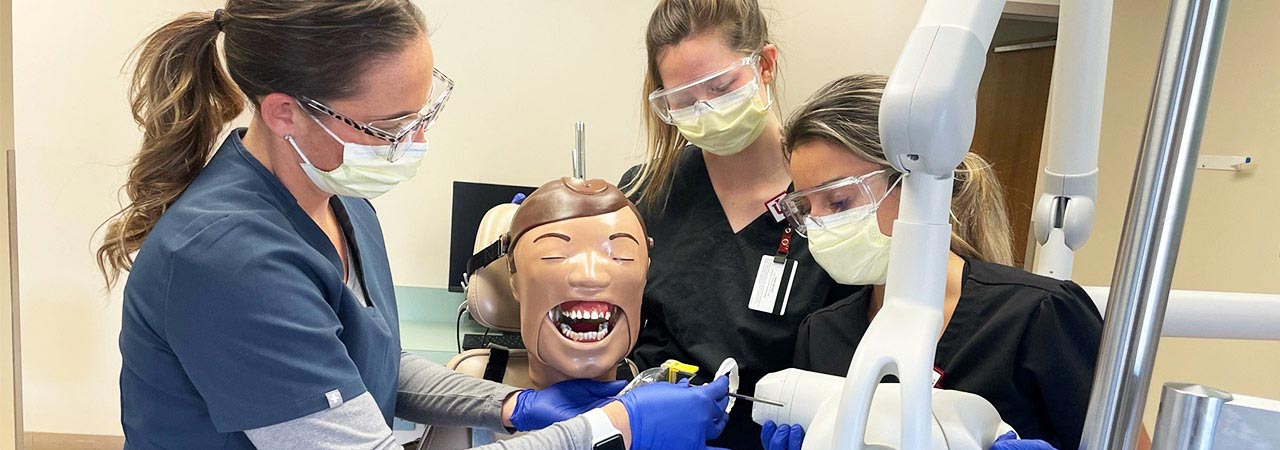IUPUI educates future dental assistants with a unique approach

There are nearly 250 dental assisting programs in the country accredited by the Commission on Dental Accreditation (CODA). How does the program at Indiana University-Purdue University Indianapolis (IUPUI) stand out from the crowd? It’s fully housed within the Indiana University School of Dentistry in Indianapolis.
That gives IUPUI dental assisting students the opportunity for a more well-rounded education and valuable experience as they move forward in their careers.
Many dental assisting programs partner with a private practice for clinical rotations. IUPUI students, on the other hand, get the opportunity to work with the variety of specialty clinics within the dental school, including orthodontics, endodontics, pediatric dentistry, and periodontology. Not only do students get to learn more about these specialties, but they also get hands-on experience working in each one.
“Students at other programs still get a great clinical experience, but our students just get to work with so many different providers in all of the recognized specialty clinics,” explains Michelle Priest, CDA, EFDA, M.B.A., who attended the program as a student, has worked there since 2007, and is now the school’s director of dental assisting.
“They don’t get just one specialty experience like most of the other CODA programs,” elaborates Priest. “They get all of the dental specialties to round out their clinical environment.”
To receive their dental assisting certificate, students must complete two semesters and 30 credit hours. This includes approximately 1,000 hours of lectures, labs, and clinical experience. At the end of the semester, students take DANB’s CDA exam, which includes the General Chairside Assisting (GC), Infection Control (ICE), and Radiation Health and Safety (RHS) component exams.
“Students come into this program not knowing a mirror from an explorer or an incisor from a molar, and they leave here knowing how to take radiographs, coronal polishing, and fluoride — they’re expanded functions. The growth in a year is just phenomenal,” says Sheri Alderson, CDA, EDA, B.S., a clinical instructor with the IU dental school since 2001.
Prepared for a variety of options
Upon completing the program and earning the dental assisting certificate, students have numerous options. Many students choose to begin their careers and start working as a dental assistant right away. Some students go on to enroll in IU’s dental hygiene or dentistry school, which is becoming more popular, says Alderson. The dental school currently has three former dental assisting students enrolled in the D.D.S. program and one who recently graduated.
“It’s certainly no guarantee to get accepted into hygiene or the D.D.S. program, but we feel that [the dental assisting program] gives them a foot in the door,” explains Alderson. “They get to know people, they make contacts, and they also learn if they like dentistry.”
Many dental assisting students end up working for the dental school down the line, either on a full-time or temporary basis while still in school.
“They really love getting our students as employees,” says Alderson. “We have former students working in all aspects of dentistry, whether it’s dental assisting, whether it’s moving on to the pre-doctoral program or becoming a dentist or an educator or a salesperson,” adds Priest.
Dental assisting students don’t necessarily have to stay in dentistry, either.
Some opt to continue their education at IUPUI after receiving their dental assisting certificate. Six other majors at IUPUI accept dental assisting credit hours, including public health and organizational leadership. “We feel like that’s a big draw,” says Alderson.
At the end of the day, Alderson and Priest are proud to play a role in their students’ development, no matter the career path they ultimately follow.
“We’ve had people who had lifelong careers as dental assistants and some who have gone on to other things. One was a lawyer,” shares Alderson. “It’s always fun to think that maybe you had some input in their development and their career from the beginning.”

